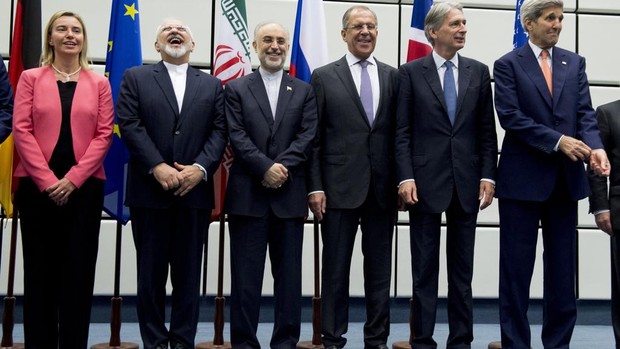
From left, the European Union high representative, Federica Mogherini; the Iranian foreign minister, Mohammad Javad Zarif; head of the Iranian Atomic Energy Organisation, Ali Akbar Salehi, the Russian foreign Minister Sergey Lavrov; the British foreign secretary Philip Hammond; and the US secretary of state John Kerry pose for a group picture at the United Nations building in Vienna after striking a landmark nuclear deal. Joe Klamar / Pool Photo via AP
The Euros are mostly unhappy after President Trump’s decision to pull out of the Iran nuclear deal. They are unhappy for two reasons. First, the Euros have made a fetish of making diplomatic bargains. They don’t particularly care if the counterparty to an agreement lives up to their promises, all they care about is making and staying in political agreements. Second, immediately after the Joint Comprehensive Plan Of Action was approved, Euro companies, in particular German companies, moved into the Iranian market in a big way. American companies were still largely barred from dealing with Iranian entities under a variety of sanctions that were not removed.
The Euros are promoting the fiction that they can keep the agreement going. It would be nice if Iran bought this fiction because then we’d have our cake and eat it too. But they can’t and the Iranians won’t.
Here is the EU foreign policy chief, Federica Mogherini (you may remember her compliantly wearing the compulsory tablecloth on her head when she last visited Iran) claiming that the deal will hold:
Speaking at a State of the Union conference, Mogherini said she has received assurances from Iranian President Hassan Rouhani that the country would stand by the agreement, despite U.S. President Donald Trump’s decision to withdraw and reimpose sanctions on Iran earlier this week.
“We are determined to keep this deal in place,” Mogherini said, adding that only Iran has the power to unilaterally wreck the deal.
The Italian diplomat will meet with the foreign ministers of Germany, France and the United Kingdom — the three European powers that brokered the nuclear deal along with the EU, U.S., China and Russia — in Brussels Tuesday to discuss the future of the agreement. The European diplomats will also meet with Iranian Foreign Minister Mohammad Javad Zarif.
Europeans are seeking to demonstrate that they can still deliver most of the economic benefits Tehran was promised in exchange for giving up its nuclear weapons program and allowing a robust system of international inspections, as well as persuade European companies active in Iran not to abandon their deals out of fear of being penalized by the U.S.
“No country is big enough to face this world alone” — Federica Mogherini
In her speech, Mogherini took several shots at Trump, though she did not mention the U.S. president by name, saying: “It seems that screaming, shouting, insulting and bullying, systematically destroying and dismantling everything that is already in place, is the mood of our times. While the secret of change — and we need change — is to put all energies not in destroying the old, but rather in building the new.
“This impulse to destroy is not leading us anywhere good,” she added. “It is not solving any of our problems.”
The French have declared US actions to be “unacceptable.”
There’s trouble in paradise for the bromance between French President Emmanuel Macron and Donald Trump. France has strongly criticized the U.S. after the Treasury Department slapped new sanctions on Iran, two days after Trump angered European allies by withdrawing from the 2015 nuclear deal. The French foreign minister said European companies would suffer because the sanctions hit firms that carry out trade with Iran. Jean-Yves Le Drian said: “We feel that the extraterritoriality of their sanction measures are unacceptable. The Europeans should not have to pay for the withdrawal from an agreement by the United States, to which they had themselves contributed.” He added Europe would “put in place the necessary measures to protect the interests of our companies and start negotiations with Washington” on the matter.
The possible action includes legislation that would block Washington from punishing European companies that continue to do business with Iran. It reflects Europe’s deep frustration with Trump’s withdrawal from the 2015 deal despite the pleas of its top leaders.
Say what?
Such legislation would likely mirror EU action to deflect a 1996 U.S. embargo against Cuba as well as U.S. sanctions against Libya and Iran. That EU response, which included appeals to the World Trade Organization, ultimately yielded a political agreement with Washington that effectively shielded European companies from enforcement action by the U.S.
EU officials were also considering new incentives to persuade Tehran to stick with the deal despite the U.S. withdrawal, including through European Investment Bank financing. While such money might be limited, it would help blunt the impact of Trump’s efforts to block Iran’s access to Western capital markets.
Europeans officials were taken aback by Trump’s decision to fully reinstate all previous U.S. nuclear-related sanctions against Iran. The move showed no sympathy for European companies that struck business deals in Iran on the belief that the nuclear agreement was accepted international policy, endorsed and affirmed by the United Nations Security Council.
“With Trump’s announcement he didn’t go half way, he didn’t go a quarter of the way, he went all the way,” said one senior EU official.
To be clear, you are counting on a strategy that worked on Bill Clinton in regards to Cuba to work on the guy who has already ignored you once and “went all the way?” How exactly does that work? If there is one thing we know for certain it’s that once Trump does something, no matter good or profoundly ill-advised, he doesn’t back down, he digs in. I sincerely doubt that any law passed by the EU designed to allow European companies to do an end-run around sanctions is going to get a lot of respect.
This is why the Europeans can’t muster enough economic muscle to keep the Iranians in the system.
The U.S. took a step toward cutting Iran off from the global economy on Thursday, levying sanctions on a financing network and accusing the country’s central bank of helping funnel U.S. dollars to the blacklisted elite military unit known as the Quds Force.
…
The actions Thursday foreshadow the return of greater U.S. economic penalties as Washington reimposes sanctions that were lifted as part of the 2015 nuclear agreement. Iran’s central bank wasn’t formally sanctioned in Thursday’s actions, but will be in the coming months, under Mr. Trump’s plan to reimpose U.S. penalties.The Trump administration is leveraging the U.S.’s economic heft and the dollar as the world’s reserve currency to pressure Iran, European countries and other nations into reaching a new nuclear agreement. The administration wants a deal that not only permanently restricts Iran’s nuclear program but also stymies its ballistic-missile efforts and curbs Tehran’s support for militants fighting across the region.
To press its case, the administration is planning to send interagency teams of U.S. officials to Asia, Europe and the Middle East to urge nations to agree to reimpose sanctions and step up pressure on Iran.
And if voluntary cooperation is not forthcoming, then we are back to sanctions on European violators:
Multibillion-dollar fines against European banks in the last comprehensive sanctions regime that led up to the 2015 nuclear deal still loom large in the minds of compliance officers, executives and board members.
Ultimately, companies are going to have to choose between doing business with Iran and doing business with the United States and/or using the dollar and international banking system.
The Europeans can engage in these pipe dreams to their hearts’ content, but it doesn’t change the facts. The economic reach of the US is just too wide to think a company can defy US sanctions and prosper.
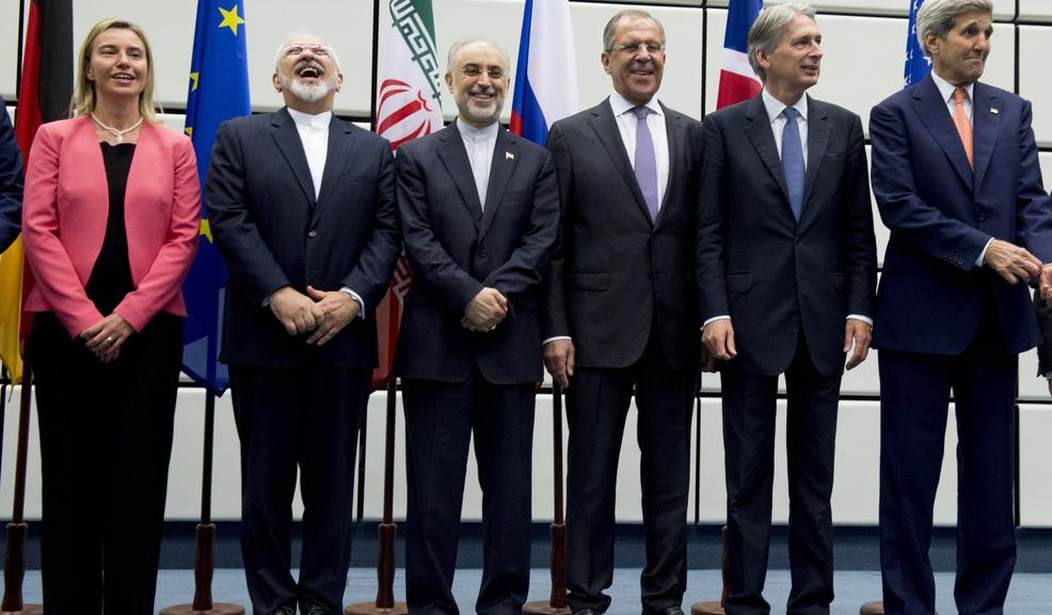



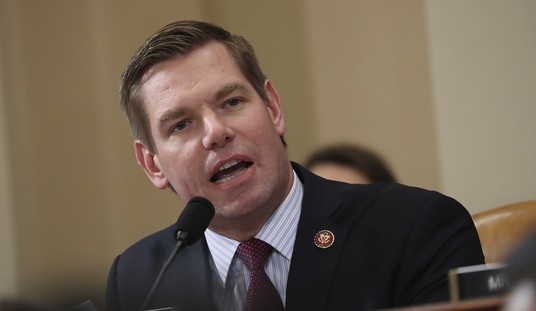





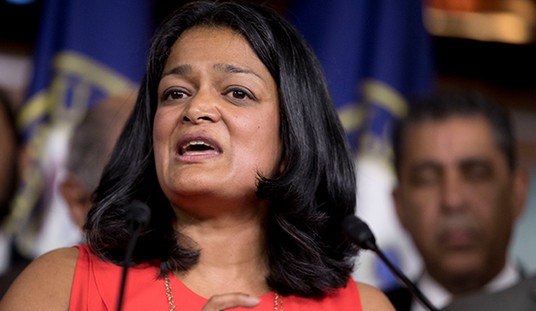

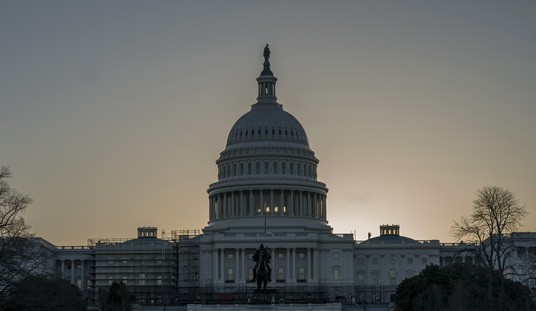

Join the conversation as a VIP Member